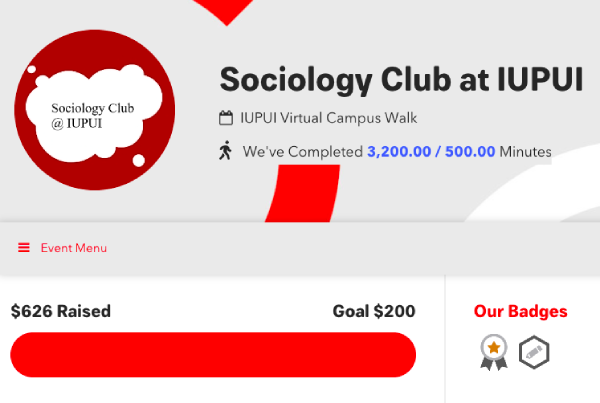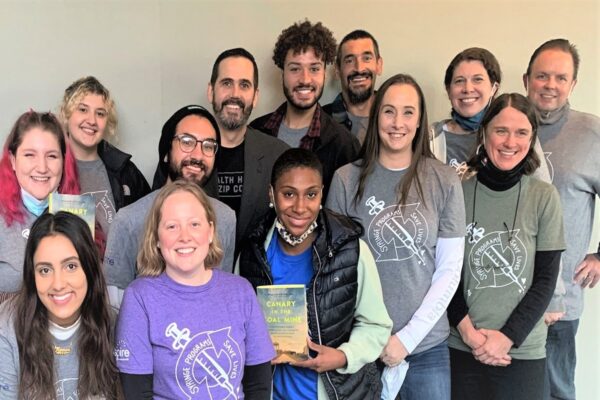
This Spring, IUPUI participated in The American Foundation of Suicide Prevention’s Walk Out of the Darkness, a campus walk and fundraiser. Campus walks are important to the American Foundation for Suicide Prevention (AFSP) because it is “designed to engage youth and young adults in the fight to prevent suicide, the second leading cause of death among people ages 15-24.” Pre-pandemic, a walk like this would be an in-person event or a 5k, however for Covid restrictions and social distancing, we held a multi-week virtual walk instead. This meant all teams and individual participants had to log activity minutes along with raising money for donations. Logging activity replaced the physical element to a normal campus walk. This activity could be anything from walking, meditating, dancing, working out, or having a conversation about mental health and suicide prevention.
Our team, the Sociology Club at IUPUI, surpassed our donation and minute goals. Our goal was to raise $200 and log 500 minutes. Our small team consisting of 6 Sociology Club members raised $626 in donations and 3,200 minutes logged. Many of us joined and are passionate about the Walk Out of the Darkness because we have a connection to the cause. I asked some of my team members why this foundation and walk is important to them, here are their responses:
- “I have done walks in the past with my family before. I have had three cousins and my best friend’s dad commit suicide. I have always wanted to raise more awareness about mental health and the suicide rates, since they are very high. These walks have been what my family has used to come together and celebrate the lives of the people we lost. Even if we didn’t donate money it gave us something to do for them.” – Brittany Ortiz
- “I participated in this walk because I’ve experienced many issues with my mental health in the past, specifically anxiety and depression, and I understand how difficult it feels to be in such a dark place. I wanted others to know that they’re not alone.” – Deepika Kaur
- “I joined the Walk Out of the Darkness walk because I have a lot of personal connections to suicide. I know several family members and close friends who struggled with the thought of suicide or did actually commit suicide. Supporting suicide prevention is extremely important to me because I have seen the impact suicide has on other people and their mental health.” – Stacey Cross
- “I have always been passionate about suicide prevention and awareness. On multiple occasions I have seen the topic of suicide brushed off or ignored because it makes people uneasy, uncomfortable, or sad. However, I think that these are some of the reasons we need to talk about it, rather than turn away from it. According to the National Institution of Mental Health in 2018 suicide was the tenth leading cause of death in the U.S., claiming over 48,000 lives. This is not something that should be brushed over or ignored. Many people in the U.S. need mental health care, or even just their community to be there for them. I participated in this Walk Out of the Darkness fundraiser for the American Foundation for Suicide Prevention with the Sociology Club because the funding goes to raise awareness, support, and understanding for those who need it. I was able to raise quite a bit of money for this cause and I am sure that it will go on to help those in need.” – Ashley Brown
I, like my teammates, have a personal connection with suicide and want to help support the American Foundation for Suicide Prevention so they have the opportunity to prevent suicides and support those who are affected by suicide. I owe a huge thanks and congratulations to the Sociology Club team for surpassing our goals; and also IUPUI as a whole, for raising $5,881 for the cause.
If you or someone you know is struggling with thoughts of suicide or have lost someone to suicide there are resources available through the American Foundation of Suicide Prevention and on-campus resources through CAPS.


